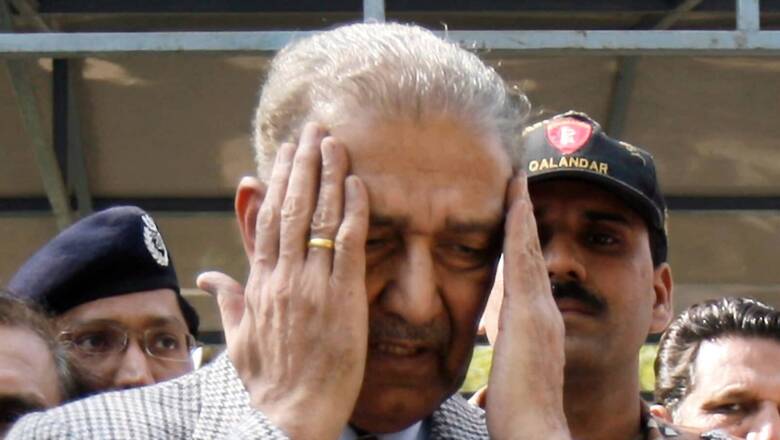
views
Controversial Pakistani nuclear scientist, Dr Abdul Qadeer Khan, passed away on October 10, 2021, aged 85. Suffering from a COVID-related affliction, he was initially treated at the Al-Shifa Hospital but later shifted to the Rawalpindi Military Hospital. Interior Minister Sheikh Rashid announced that he would be accorded a state funeral, with instructions to the military top brass to attend.
Born in Bhopal in 1936, stories abound about the bitterness Khan acquired for India, as he witnessed, as an observant teenager, the horrors of Partition during a train journey across central and northern India in 1951. After earning his Bachelor of Science from Karachi University, Khan pursued his Masters from the University of Delft, Holland, followed by a PhD from the University of Leuven, Belgium. His expertise focused on metallurgical engineering, in which he pioneered studies in phase transitions of metallic alloys, uranium metallurgy, and isotope separation, based on gas centrifuges. He then accepted a job at the Fysisch Dynamisch Onderzoek (FDO), a subsidiary of the Ultracentrifuge Nederland (UCN), a member of a consortium called URENCO, in Almelo, Netherlands.
In August 1974, he wrote to then prime minister Zulfiqar Ali Bhutto volunteering to come and work on the uranium enrichment process. Pakistan’s nuclear quest under their Atomic Energy establishment (PAEC) had been moving in fits and starts, at times almost running aground due to bureaucratic inertia. Khan tried to persuade Bhutto and Ghulam Ishaq Khan (then a senior Finance department bureaucrat) that he could jump-start the process.
This was the advent of Kahuta Research Laboratories in 1976 (KRL was later renamed Khan RL), his clandestine theft of enrichment technology with the help of his Dutch and German friends, and intense rivalry with Munir Khan, chairman, PAEC. He remained KRL’s chief scientist and director, led the country’s nuclear programme for well nigh 25 years, becoming a national hero in 1987, when Pakistan went public on its nuclear acquisition. In July 1987, Khan is believed to have deliberately leaked the information, through a pro-establishment journalist, Mushahid Hussain (currently a PML-Nawaz Senator), to visiting Indian journalists late Kuldip Nayyar and Shekhar Gupta.
In his later years at KRL (mid-1990s), Khan also initiated a full-scale missile development programme with help from the Chinese and North Korea. He was awarded the Nishan-i-Imtiaz for his services to the country.
This is a far cry from the ignominy Khan faced for his clandestine attempts at nuclear proliferation in Libya, Iran and North Korea, which was exposed so dramatically by the US Central Intelligence Agency (CIA) Director George Tenet to then Pakistan president General Pervez Musharraf in January 2004. This forced the latter to keep Khan in house arrest temporarily, throwing him off his ‘demi-god’ pedestal in Pakistani civil society. Khan was accused of selling nuclear secrets illegally and he confessed, apparently under duress, to these charges. Though he was pardoned with some fanfare by Gen Musharraf, he could not quite live down his quest for a quick buck, through undisclosed or unauthorised travel to Timbuktu (North Africa-Niger) and association with a distant nephew, Syed Abu Taher Bukhari’s factories in Malaysia (Scomi Engineering) and Dubai, for export of nuclear components to Libya.
Threads of similar connections and efforts at centrifuge sales to Iran and North Korea emerged in later investigations, much to the embarrassment of the Pakistan Army, which was seen to be complicit at top leadership levels.
In June 1998, when a North Korean diplomat’s wife in Islamabad, Kim Sa Nae, planned to defect and seek refuge in a Western mission, she was mysteriously killed in an ostensible ‘cooking accident’. Rumours surfaced that shortly before then, she had been given temporary refuge in Khan’s Islamabad house. This was certainly known to the Pakistan Army and Inter-Services Intelligence (ISI). The matter was hushed up and the diplomat in question quietly left Pakistan.
Though the military leadership under president Musharraf tried to distance itself from any foreknowledge of these dealings, this strained credulity of the Pakistani nuclear scientists’ community, especially after nine members of Khan’s top team of scientists and personal staff working at KRL were arrested. Their families were placed under the surveillance of the ISI even as they sought legal remedies (habeas corpus). The offended scientists let Western newsmen and human rights activists know, through some Pakistani intermediaries, that the military leadership’s attempt to pose ignorance of these sales to North Korea, Libya and Iran was palpably untrue.
At one stage in 2006, a beleaguered Khan threatened to disclose ‘military secrets’ in a letter already ferreted away to his wife, late Henny Khan, who was then living in Holland, through his daughter, Dina.
After years of house arrest, Khan successfully filed a lawsuit against the Federal Government of Pakistan at the Islamabad High Court, whose verdict declared his debriefing under house arrest unconstitutional and freed him on February 6, 2009. The United States reacted negatively to the verdict and the Obama administration issued an official statement warning that Dr Khan still remained a “serious proliferation risk”.
Ironically enough, the rivalry between Pakistan’s top scientists continued even after Dr Munir Khan’s demise (1999). Dr Samar Mubarakmand, who became head of National Engineering Services, (NESCOM), and supervised the Chagai-1 and Chagai-2 nuclear tests at the Ras Koh testing range in Balochistan in May 1998, decried Khan’s role and status at every possible opportunity.
Meanwhile, after the US exposed Khan’s proliferation network, a reorganisation of Pakistan’s nuclear organisation took place. Lt Gen Khalid Kidwai, then a serving General from the Artillery, was appointed head of the Strategic Plans Division (SPD) in February 2000. He became the virtual tsar of all matters pertaining to Pakistan’s nuclear programme. He continued in this post till December 2013, even though retiring formally from the Army in 2007. All military or dual-use nuclear activities were brought under control of the NCA (National Command Authority).
Much to his lasting chagrin, Khan had to watch these developments from a distance, lamenting why his destiny could never really be fulfilled or acknowledged by an ungrateful nation and its ‘spoilt brat’ military establishment.
The writer is a former special secretary, Cabinet Secretariat. Views expressed are personal. The views expressed in this article are those of the author and do not represent the stand of this publication.
Read all the Latest News , Breaking News and IPL 2022 Live Updates here.


















Comments
0 comment